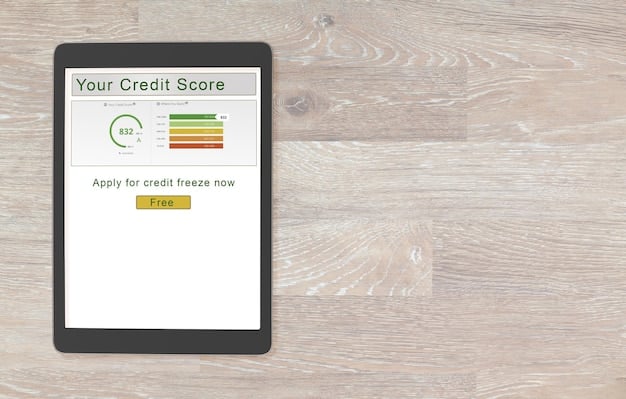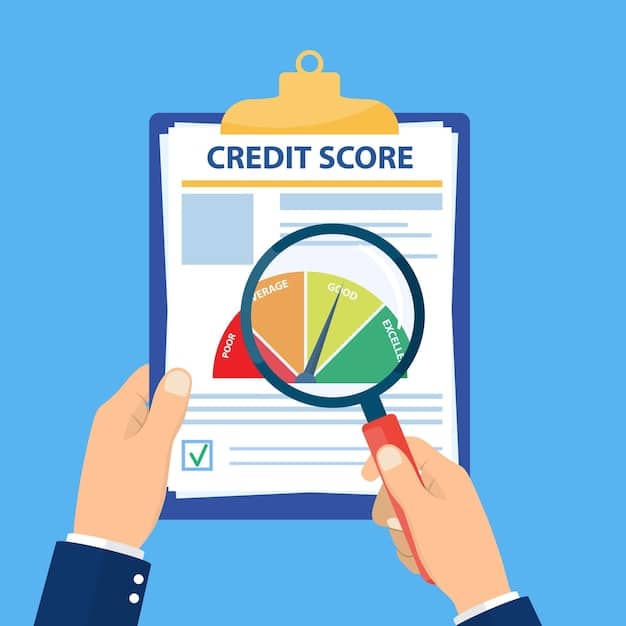The Impact of Credit Score on Housing Applications: Improve Your Score in 3 Months

The impact of credit score on housing applications is significant, directly influencing approval odds, interest rates, and rental opportunities; improving your credit score within three months involves strategic actions like correcting errors, paying down balances, and avoiding new debt to enhance your housing prospects.
Understanding the impact of credit score on housing applications is crucial for anyone looking to rent or buy a home. A good credit score can unlock better opportunities and save you money in the long run.
Understanding the Importance of Credit Score in Housing
Your credit score is more than just a number; it’s a key that unlocks doors, especially when it comes to housing. Landlords and mortgage lenders use it to gauge your financial responsibility and predict your likelihood of paying rent or mortgage on time. A higher score often translates to better terms and more opportunities.
How Credit Scores Affect Mortgage Applications
When you apply for a mortgage, lenders will scrutinize your credit score. A lower score can mean higher interest rates, larger down payments, or even outright rejection. Understanding how your credit score impacts your mortgage options is the first step towards securing your dream home.
Credit Scores and Rental Applications
It’s not just about buying; renting also hinges on your credit score. Landlords want to ensure you’re a reliable tenant, and a good credit score signals that you’re likely to pay rent consistently and on time. A poor score could lead to rejection or require a larger security deposit.

Here are the key factors that makes credit score so important:
- Interest Rates: Higher credit scores often qualify you for lower interest rates on mortgages, saving you thousands of dollars over the life of the loan.
- Approval Odds: A strong credit history increases your chances of getting approved for both mortgages and rental applications.
- Rental Opportunities: Landlords prefer tenants with good credit, offering you a wider range of rental options.
- Negotiating Power: A good credit score can give you leverage to negotiate better terms on your lease or mortgage.
In summary, a strong credit score is fundamentally important in order to get a better home because it can get you approved, get you lower interest rates, and it makes you more attractive to leasers.
Assessing Your Current Credit Score
Before you can improve your credit score, you need to know where you stand. Assessing your current credit score provides a baseline for tracking your progress and identifying areas for improvement. Here’s how to get started.
Obtaining Your Credit Report
You’re entitled to a free credit report from each of the three major credit bureaus—Equifax, Experian, and TransUnion—every 12 months. Visit AnnualCreditReport.com to access your free reports. Review them carefully for any errors or discrepancies that could be dragging down your score.
Understanding Credit Score Ranges
Credit scores typically range from 300 to 850. Generally, a score of 700 or above is considered good, while a score of 750 or above is excellent. Knowing where your score falls within this range can help you understand your approval odds and the terms you might qualify for.
When checking your credit report, verify the following information.
- Personal Information: Ensure your name, address, and date of birth are accurate.
- Account Information: Check for any accounts you don’t recognize or errors in payment history.
- Public Records: Review any bankruptcies, tax liens, or judgments listed on your report.
In conclusion, know your score to know where you need to be. You are entitled to a free credit report every 12 months from each of the three major credit bureaus.
Quick Fixes: Correcting Errors and Disputing Inaccuracies
One of the quickest ways to improve your credit score is by addressing errors on your credit report. Even minor inaccuracies can negatively impact your score, so it’s essential to dispute any mistakes as soon as you find them.
Identifying Common Credit Report Errors
Common errors include incorrect account balances, late payments that were not actually late, accounts that don’t belong to you, and outdated information. Carefully reviewing your credit report can help you spot these errors and take action.
The Dispute Process: A Step-by-Step Guide
To dispute an error, contact the credit bureau in writing and provide detailed information about the inaccuracy. Include any supporting documentation that proves your case. The credit bureau has 30 days to investigate and respond to your dispute.

Here’s how to do it properly:
- Gather Documentation: Collect any documents that support your dispute, such as payment confirmations or account statements.
- Write a Clear Dispute Letter: Clearly explain the error and why you believe it’s inaccurate. Be concise and professional.
- Send Your Dispute: Mail your dispute to the credit bureau via certified mail, so you have proof that it was received and when.
Quick fixes goes a long way in boosting your credit score in a short amount of time. Make sure to properly dispute so you can boost it sooner.
Strategic Debt Management: Paying Down Balances
Reducing your debt is crucial for improving your credit score. High debt levels can negatively impact your credit utilization ratio, which is the amount of credit you’re using compared to your total available credit. Paying down balances strategically can make a significant difference.
Understanding Credit Utilization Ratio
Credit utilization ratio is a key factor in calculating your credit score. Experts recommend keeping your credit utilization below 30% of your available credit limit. For example, if you have a credit card with a $1,000 limit, aim to keep your balance below $300.
Prioritizing Debts: Which Balances to Pay First
Consider using the debt avalanche or debt snowball method to prioritize which debts to pay down first. The debt avalanche method focuses on paying off debts with the highest interest rates first, while the debt snowball method prioritizes paying off the smallest balances first for quick wins.
Effective debt management involves the following.
- Create a Budget: Develop a budget to track your income and expenses, allowing you to allocate more funds to debt repayment.
- Automate Payments: Set up automatic payments to ensure you never miss a due date, avoiding late fees and negative impacts on your credit score.
- Avoid New Debt: Refrain from opening new credit accounts or taking on additional debt while you’re working to improve your credit score.
Strategic debt management is a must if you want to improve your credit score for housing. Make sure to prioritize your debts when trying to pay it down quicker.
Positive Credit Habits: Building a Strong Credit History
Establishing positive credit habits is essential for building a strong credit history over time. These habits not only improve your credit score but also demonstrate financial responsibility to lenders and landlords. Consistency is key when forming these habits.
Making Timely Payments Consistently
Payment history is one of the most significant factors in your credit score. Always pay your bills on time, every time. Consider setting up automatic payments or reminders to ensure you never miss a due date.
Keeping Old Accounts Open (Responsibly)
The age of your credit accounts also impacts your credit score. Keeping old accounts open, even if you don’t use them regularly, can demonstrate a long credit history. Just be sure to use them responsibly and avoid accumulating debt.
Good habits leads to a good credit score, here are some ways to help.
- Use Credit Sparingly: Avoid maxing out your credit cards. Keep your balances low and manageable.
- Monitor Your Credit: Regularly check your credit report for any signs of identity theft or errors.
- Diversify Your Credit: Having a mix of credit accounts, such as credit cards, loans, and mortgages, can positively impact your credit score.
Forming good habits are essential in building a better credit score history. The more diligent you are, the more your score improves in a short amount of time.
The 3-Month Plan: Steps to Improve Your Score Quickly
Improving your credit score in three months requires a focused and strategic approach. By following a detailed plan, you can make significant progress and boost your chances of securing better housing options.
Week 1-4: Focus on Error Correction and Dispute
During the first month, focus on obtaining and reviewing your credit reports. Identify any errors or inaccuracies and initiate the dispute process. Gather supporting documentation and submit your disputes to the credit bureaus.
Week 5-8: Implement Debt Reduction Strategies
In the second month, implement debt reduction strategies. Create a budget, prioritize your debts, and start paying down balances. Focus on reducing your credit utilization ratio and making timely payments.
Week 9-12: Maintain Positive Habits and Monitor Progress
In the final month, continue to maintain positive credit habits. Pay all your bills on time, keep your credit utilization low, and monitor your credit report for any changes. Celebrate your progress and stay committed to maintaining a strong credit history.
- Review Credit Reports Weekly: Stay vigilant for any new errors or changes in your credit report.
- Set Up Payment Reminders: Ensure you never miss a payment due date by setting up reminders or automating payments.
- Avoid New Credit Applications: Refrain from applying for new credit during these three months to avoid negatively impacting your credit score.
The 3 month plans are essential in building a credit score quickly. Make sure to stick to the timelines, because it will greatly improves chances in building a score fast.
| Key Point | Brief Description |
|---|---|
| ✅ Check Credit Report | Identify & dispute errors for quick score boost. |
| 💸 Pay Down Debt | Lower credit utilization; aim below 30%. |
| 🗓️ Timely Payments | Always pay bills on time; set reminders. |
| 🚫 Avoid New Debt | Focus on improving current credit health. |
Frequently Asked Questions (FAQ)
▼
You should check your credit report at least once a year, or more frequently if you are planning to apply for a loan or mortgage. Checking regularly helps you spot any errors or inaccuracies promptly.
▼
A good credit utilization ratio is generally below 30% of your available credit limit. For example, if you have a credit card with a $1,000 limit, try to keep your balance below $300 to maintain a good score.
▼
The time it takes for your credit score to improve varies depending on your starting point and the actions you take. Some strategies, like correcting errors, can have a quick impact, while others, like building a positive payment history, take time.
▼
Closing a credit card can negatively impact your credit score if it reduces your overall available credit. It’s generally better to keep old accounts open, as long as you use them responsibly and avoid accumulating debt.
▼
If you have no credit history, you can start building credit by opening a secured credit card or becoming an authorized user on someone else’s credit card. Make sure to use credit responsibly and pay your bills on time.
Conclusion
Improving your credit score is a worthwhile investment, especially when it comes to housing applications. By understanding the importance of your credit score, assessing your current standing, and implementing strategic steps to correct errors, manage debt, and build positive habits, you can significantly enhance your housing opportunities and financial future.





